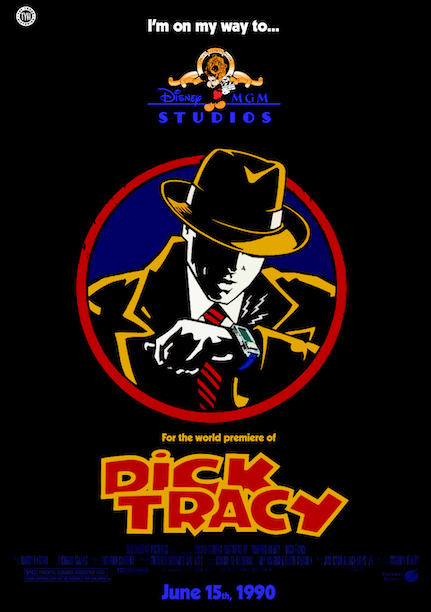Friday, June 15, 1990
DICK TRACY. Written by Jim Cash and Jack Epps Jr. Music by Danny Elfman. Produced and directed by Warren Beatty. Running time: 104 minutes. Rated Mature with the B.C. Classifier’s warning: "some violence.”
DICK WHO?
Dick Tracy. Surely you remember the great comic strip crimestopper?
A depression-era gangbuster, the square-chinned police detective first appeared in U.S. funny papers in 1931. It was the era of the real-life Bonnie and Clyde.
Warren Beatty remembers. The actor who made his reputation playing legendary bandit Clyde Barrow (in Arthur Penn's 1967 feature Bonnie and Clyde), Beatty produced, directed and stars in Dick Tracy, a quaintly eccentric attempt to rescue the violence-prone lawman from well-deserved obscurity.
It's a film with a distinctive look. Beatty, being hyped as "a motion picture visionary," insisted upon fidelity to Tracy creator Chester Gould's "visual intentions."
According to production designer Richard Sylbert, "our first major decision was to use only the seven primary colours Gould used in his drawings." Credit Beatty, the man who produced Ishtar, with inventing live-action limited animation.
Gould, limited by his medium, created unidimensional tales populated by uncomplicated grotesques. A vengeance-driven Tracy endured pain and personal injury to justify the hideous deaths meted out to the strip's irredeemably evil villains.
Beatty limited his medium to produce a unidimensional exercise in stylistic indulgence. Fun to watch at the start, Dick Tracy quickly becomes a bombastic bore.
For a storyline, screenwriters Jim Cash and Jack Epps, Jr. recycle the old one about the crime boss moving to consolidate power in a generic 1930s American city. “Big Boy” Caprice (Al Pacino, stealing the show while under a ton of make-up) eliminates Lips Manlis (Paul Sorvino), claiming his territory and his moll, saloon singer Breathless Mahoney (Madonna).
The untouchable Tracy (Beatty) vows to get the Big Boy. The oh-so touchable Mahoney vows to get Tracy. The matte painters and make-up artists got overtime.
Madonna, whose previous feature-film outings (Shanghai Surprise; Who's that Girl) were major flops, is reasonably effective as bad girl Mahoney, a self-described "cheap floozie." Beatty, unfortunately, is just plain miscast as the unstoppable cop.
Faced with Mahoney's proffered charms, Beatty's Tracy is less a hero than a stolid, sweaty joke. What's worse, he's also a hypocrite.
As written, this Tracy preaches uncompromising adherence to the law. As played, though, he stands above such inconveniences as due process, civil rights and the presumption of innocence.
What the hey, it's just a comic strip, right?
Aware that hardly anyone under 40 knows who Dick Tracy is, Touchstone Pictures is working hard to create an event atmosphere around it. Like last year's Batman, it's supposed to be a phenom, the item to see and talk about.
No creative hit, if Beatty's picture is a big success it will be a tribute to mass marketing.
The above is a restored version of a Province review by Michael Walsh originally published in 1990. For additional information on this archived material, please visit my FAQ.
Afterword: As the above review makes clear, Chester Gould's Dick Tracy was not among my favourite comic strips. I did take considerable delight, though, in Fearless Fosdick, the comic strip-within-a-comic strip that Al Capp included in his long-running L’il Abner. For 35 years (1942-1977), Capp’s creation heckled Gould’s shoot-first lawman. According to Fosdick’s Wikipedia entry, the character “was almost certainly Harvey Kurtzman’s major influence for creating his irreverent Mad magazine." If true, Fosdick then can be credited with having made a major contribution to mid-20th-century culture.
Also obvious from the above review is my lack of excitement at Warren Beatty’s sophomore outing as a solo director. Yes, I was aware that his previous time behind the camera, 1981’s Reds, had resulted in him winning a Best Director Oscar. To my mind, though, Hollywood’s excitement over his self-important period piece had more to do with self-identified liberals reacting to the inauguration of President Ronald Reagan than to the picture’s artistic quality. I’d argue that Beatty proved my point by going on to produce and perform in the truly embarrassing Ishtar (1987).
In a 2021 interview, he linked the two projects, saying “I think the underlying themes in Dick Tracy are no more trivial than the themes in Reds, you know. They have to do with family and love and duty.” Well, OK then — comic-book gang warfare and the Bolshevik Revolution, more or less the same. Could it be that the soon-to-be 85-year-old Beatty plans to segue into making movies in the Marvel Comics Universe (MCU)? Perhaps the Dick Tracy sequel, that reports say he’s been developing since 2016, will be among them. In the meantime, we can take pleasure in recalling his third and fourth directorial achievements: 1998’s Bulworth, in which he plays the title character, a California senator running for reelection, and Rules Don’t Apply (2016), a biographical romance that features Beatty in the role of Howard Hughes.
